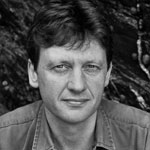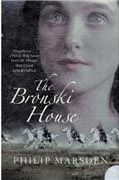 Philip is well known to many Roseland online readers, if not as a neighbour, then certainly as a writer, winner of a Thomas Cook Award. He is also a novelist (his novel The Main Cages was set in Cornwall).
Philip is well known to many Roseland online readers, if not as a neighbour, then certainly as a writer, winner of a Thomas Cook Award. He is also a novelist (his novel The Main Cages was set in Cornwall).
He and his family recently moved from St Mawes to a nearby village, and I spoke to him on the terrace of the Tresanton, within sight of the sea, which plays such a pivotal role in his latest book The Levelling Sea and which has been a major part of his life since childhood.
Philip studied anthropology and has travelled extensively, but he always knew he wanted to become a writer – at one time he worked for The Spectator – and firmly believes in writing about what he knows. The variety of subjects he has covered in his books and articles demonstrates his wide range of interests. He has written about Ethiopia and his book The Bronski House was the result of a trip in the summer of 1992, with the poet Zofia Ilinska (then living in Cornwall), to the Belorussian village where she spent her childhood
Discussing where his ideas come from and how he plans his books, Philip said that “in life you pick up information like dust as you go along your way”. He starts with an idea but doesn’t plan how the book will end or how it will get there. It is only when he reaches the second draft stage that a structure becomes clear and the end product begins to emerge.
 The Levelling Sea had its genesis during his preparatory work for The Main Cages – some of his research didn’t quite fit into the final book so he looked for a way he could bring it to light in another form.
The Levelling Sea had its genesis during his preparatory work for The Main Cages – some of his research didn’t quite fit into the final book so he looked for a way he could bring it to light in another form.
Our interview (chat?) takes the sort of diversions so fascinating to Philip and we talked about topics as diverse as the Azeri language and culture (a mutual interest), history lessons in school, corruption in the Elizabethan age, Jewish culture, sailing, the Roseland Festival and Swallows and Amazons, particularly appropriate as he has some of Arthur Ransome’s love of language, travel and the written word.
He writes at home, but away from the house, believing it is vital to work under a different roof if he is to avoid

day to day distractions. He has variously used a chalet overlooking the sea, a shed and a caravan. A book generally takes around two years, much of that time spent researching background, often taking detours based on material uncovered in public records and elsewhere, but, the germ of an idea might, as with his latest work, take root many years before.
Philip is currently working on a book about the landscape, not the sea, although it too is about Cornwall. Like The Levelling Sea it relies heavily on Philip’s interest in lifting the lid on things to discover all he can and taking detours from the main route.
The phrase “picker up of unconsidered trifles” might have been invented for him and is particularly evident when he describes his enthusiasm for discovering the past, for example the joy of reading handwritten notes from decades ago, sometimes centuries ago, as well as finding inspiration from what lies almost on his doorstep.
 As to the future for hardbacks and paperbacks, Philip believes the presentation isn’t whatmatters it’s the content and that the real challenge in the e reader age is for booksellers, particularly the smaller ones.
As to the future for hardbacks and paperbacks, Philip believes the presentation isn’t whatmatters it’s the content and that the real challenge in the e reader age is for booksellers, particularly the smaller ones.
Finally I asked him what he wanted his readers to get from his books, “I love working with language. I have a real passion for the things I write about and it is that I want readers to share.” The Levelling Sea brings together the power of the sea and the power of the word and, as you will see from my review I think he has achieved his goal. I hope you will think so too. It’s a fascinating story full of intriguing titbits. Maybe you should buy it (or your next book) from your local bookshop – if you don’t use it we’ll all lose it!

